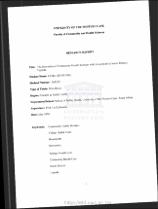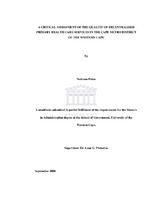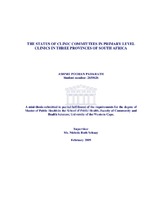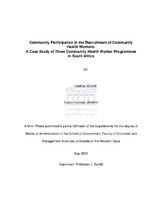| dc.description.abstract | Like many other developing countries, Uganda lately adopted the Village Health Team (VHT) Strategy to support the delivery of cost-effective Primary Health Care services in the rural areas. This strategy is intended to raise interest amongst communities to be concerned
about the improvement of their own health and increase community participation in health care activities through utilisation of VHT members (Community Health Workers). Soroti, a rural district located in Eastern Uganda is one of the few districts in this country that has,
since 2004, used Community Health Workers (CHWs) to support her health care delivery system (Soroti District, Undated But despite all the interventions made, the District Health Team and implementing stakeholders in this district are uncertain about exactly how CHWs interact with households, yet this issue is crucial if CHWs are to serve as the bridge between the health system and the community. The purpose of this study was therefore to better understand the interaction between CHWs and households in Soroti District, Uganda, by engaging with both household members and CHWs about their interactions with each other. The study was descriptive in nature and employed qualitative research approaches. It was conducted in Olio, Kyere and Kateta Sub-counties of Soroti between November 2008 and December 2009.\t is hoped that the results will inform future larger evaluations of the effectiveness of CHW programmes in Soroti District. A total of 24 CHWs participated in the study, the majority (75%) of whom were male and the rest (25%) were female. Twenty four household representatives (carers) and two Health Assistants also participated in the focus group discussions and key informant interviews respectively. It was found out that the relationship between CHWs and households in Soroti was generally good, which could increase the likelihood of success and sustainability of the CHW program. This positive relationship was primarily attributed to the recruitment approach of CHWs through a democratic community structure, good level of awareness of CHWs' roles by household members, good behaviour exhibited by CHWs, their training, skills, working approach and perceived impact of their work. However, some factors such as stock-outs of supplies at health centres, poor relationship between some professional health workers at health facilities and CHWs, inadequate facilitation of CHWs, and their lack of remuneration, could be detrimental to this relationship and the success and sustainability of the CHW program, if not urgently addressed. It is recommended that the Ministry of Health, Soroti District Health Office and development partners should continue supporting and promoting initiatives which strengthen the relationship between CHWs and household members and increase the possibility of success
of the CHW Program; and also urgently address the identified hindering factors. | en_US |




